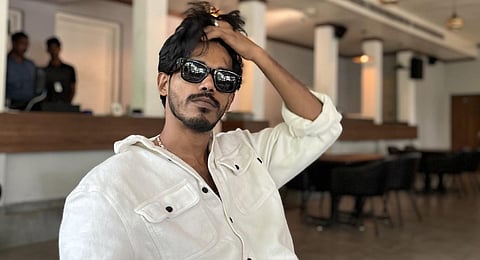

‘Manavaalan Thug’, from ‘Thallumaala’, had people grooving to the colloquial slang of Malabar. Initially, the lyrics piqued my curiosity. Then, people of all ages were seen tuning in to the rhythm. This track changed the life of an indie artist – Mohammed Fazil, aka Dabzee – from Malappuram.
Before the big break, Dabzee had left his corporate job in the Gulf and grinded for several years solely fuelled by his passion for music. Now, one can say he is living the life of his dreams.
Notably, Dabzee is one of the few artists from south India to get signed to the Indian extension of Nas’s Mass Appeal, an international music label that has catapulted several international hitmakers. “It’s a significant landmark for all independent artists from the south,” says Dabzee. “I hope this boost helps amplify south-side rap and draw more attention to it.”
Excerpts from the interview:
How did your journey begin?
From a young age, I was influenced by my father’s love for mappila music. I used to eagerly learn the songs. However, as life’s responsibilities increased, I moved to UAE and took up a conventional job. Yet, my passion for music remained undiminished. I always penned down my feelings and experiences. My inner quest for music never faded. I faced criticism from loved ones, when I quit my job. However, they now take pride in my achievements.
How did ‘Manavaalan Thug’ happen?
It was unexpected, coincidental. ‘Manavaalan Thug’ was a track intended for my independent album. However, some friends who were part of the Thallumaala team, got hooked and approached me. The essence of the song aligned perfectly with their vision. I collaborated with one of my dearest friends, rapper ‘SA’, for the track.
And after ‘Manavaalan Thug’?
After ‘Manavaalan Thug’ came ‘Olam Up’. It was played in every other wedding venue. The track went viral as a dance hit, but if you pay attention to the lyrics, it stresses on the need for marital equity. That is how I convey my own messages and essence, whether it be a commercial track or an indie one.
Dulquer Salmaan, whom I respect a lot, mentioned ‘Olam Up’ as his most-listened song on Spotify. I was over the moon. Getting to work with Jakes Bejoy for Dulquer’s ‘Kotha Raja’ was a fortunate moment in my life.
Is there a specific reason for playing up the Malabari slang?
There was a time when I was bullied due to my Malabari slang. I would often ask, ‘Why was I being ridiculed for the slang used by my family and my community?’ I am proud to be from this small part of the world, and its own unique way of conversation. I felt obligated to represent my culture and its authentic voice. ‘Malabarinte paattu dabba paadum’, as I have said in my music. I will strive for it, and ensure it reaches the global stage.
The cover of ‘Malarkodiye’ became an internet sensation. Were you expecting such a response?
My music is about reviving memories for a generation that grew up listening to mappila songs. One day, I casually posted the cover version of a once-popular mappila song, ‘Malarkodiye’. I never expected it to get such an overwhelming response. An elder woman mentioned that the song, now trending on Instagram, was sung at her wedding, bringing back a flood of nostalgia for her. That’s a sweet success.
Classics never die. The revival of ‘Malarkodiye’ is a perfect example. Mappila songs hold a unique charm. I aim to reintroduce this beauty to a generation that overlooked it.
Do you believe hip-hop/rap can serve as a platform to address social injustices?
I am a part of ‘Manushyar’, a collective focused on addressing socio-political issues through music. We talk about the issues unfolding in front of our eyes. With tracks like ‘Marijaan’ and ‘Manushyan’, we ask thought-provoking questions. I have seen women in my own family struggle due to unwritten laws; I have seen people being harassed due to their skin colour; I have seen people in power exploiting the underprivileged… An artist shouldn’t be afraid to draw attention to such topics.
You have emerged as a top pick for live events. What is the secret behind the mojo?
Ganamela is a common event at every wedding in Malabar. I have been taking part in them since my childhood, so I’m not new to the stage. Watching the audience join in and sing along provides a sense of validation and fulfilment. Even toddlers can be seen catching up with the lyrics. That’s my secret.
Any advice for rookie artists?
Starting out as an indie artist was tough, but I had faith in my work. If you are confident in your content and focus on its quality, recognition will come to you. Rather than having an intention of just going mainstream, you should work on your content and ensure it stands apart.